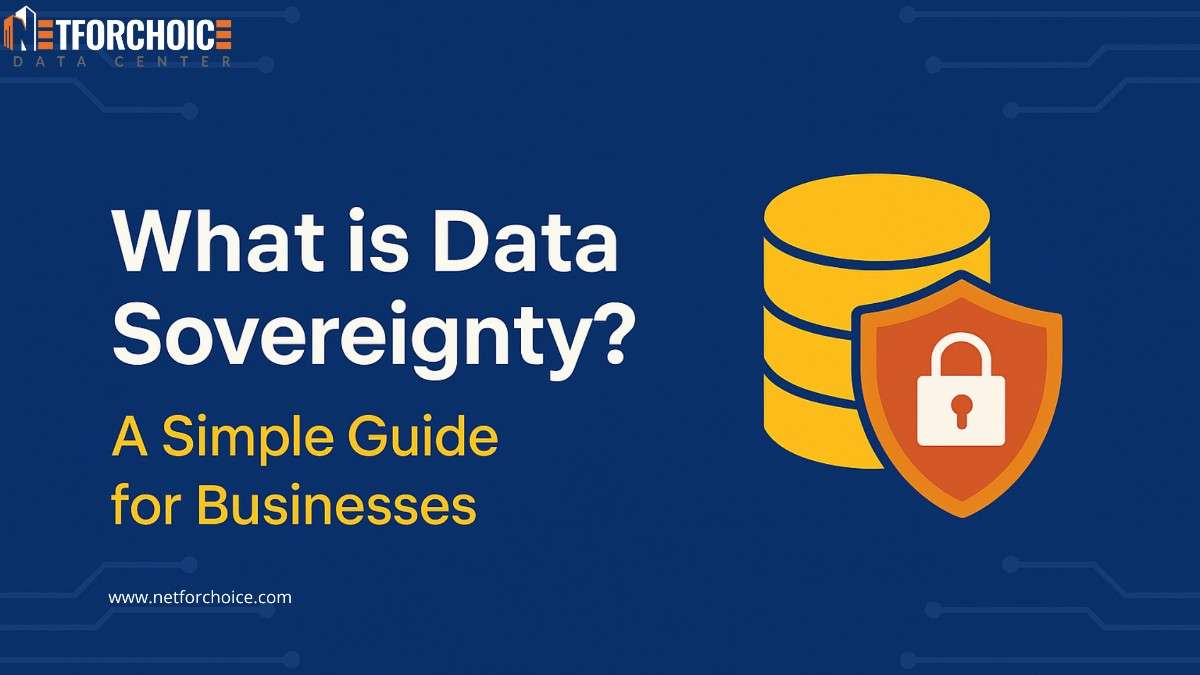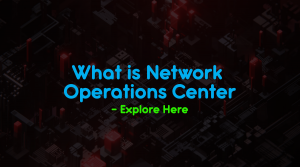What is Data Sovereignty? A Simple Guide for Businesses

One of the key concepts in the modern digital economy is data sovereignty. Simply put, data sovereignty refers to the fact that the laws and regulations of the nation in which your data is physically located apply to the data you create, process, and store. This idea is now required for businesses; it is no longer an option.
Data is continuously moving between servers worldwide in an era of cloud computing, cross-border transactions, and remote work. Every nation, however, has its own regulations pertaining to data privacy and compliance. This makes companies ask an important question: Who controls my data, and where is it stored?
Let’s simplify it, examine the value of data sovereignty for companies, the difficulties they encounter, and how services like NetForChoice’s data center services in India assist companies in maintaining compliance while maintaining efficiency and security.
What is Data Sovereignty?
In simple terms, data sovereignty refers to the fact that data is governed by the laws of the nation in which it is located. For instance, if your business keeps client data in India, it will be bound by the country’s unique privacy laws and Data Sovereignty.
This concept is closely related to:
- Data Residency: The physical location of your data storage.
- Data localization is the rule that some data, like financial or medical records, must stay inside a country’s boundaries and cannot be moved to another.
These definitions have a direct influence on the way businesses select hosting providers, manage client information, and remain in regulatory compliance.
Importance of Data Sovereignty for Businesses
- Compliance with local legislations
Privacy of data is being reinforced by governments everywhere. With regulations such as the Digital Personal Data Protection Act (DPDP), data privacy is emerging as an increasingly significant challenge in India. Penalties, legal proceedings, and damage to one’s reputation can be a consequence of non-compliance.
- Transparency & Customer Trust
Customers nowadays are extremely sensitive to the storage and use of their personal data. By implementing data sovereignty in India, businesses can guarantee customers that their personal data is safe and handled in a way that is suitable for their sensitivities, therefore fostering trust.
- Reduced Legal Risks
Firms can be under the jurisdiction of overseas laws when they store information overseas. Legal problems can become more intricate accordingly, especially when there are disputes. Firms minimize threats by adhering to data residency and data localization standards.
- Enhanced Governance & Security
More stringent management is provided by local storage under domestic regulations, allowing data privacy regulation within India. It also aids in evasion of abuse or illicit cross-border surveillance.
Data Sovereignty Challenges for Businesses
- Cloud Services Across Borders
The majority of companies use global cloud providers, which store data across several different locations. This leads to conflicts between the provider’s standard storage policies and local data sovereignty laws.
- Growing Costs of Compliance
Investing in new infrastructure, legal advice, and ongoing audits is frequently necessary to meet data localization requirements. Operational expenses may rise as a result, particularly for SMEs.
- Limitations on Data Transfer
Multinational corporations’ operations may be slowed down by limitations on data movement across international borders. It becomes challenging to collaborate internationally, share files, and deliver seamless services.
- Changing Rules
Laws associated with data protection are always evolving. The Data Privacy India framework, for instance, is still developing. To stay in compliance, businesses need to stay up-to-date.
- Legacy System Integration
Many businesses continue to use outdated technologies that aren’t built to meet the demands of modern data sovereignty or residency. Making the switch to compliant infrastructure can be challenging.
Why Indian Businesses Need to Care About Data Sovereignty
Data sovereignty for Indian businesses is a key strategic concern, especially for Indian businesses that deal with highly sensitive consumer data in sectors such as banking, healthcare, and e-commerce.
- Financial Sector: RBI mandates that financial data must be stored locally.
- Healthcare Sector: Besides Indian privacy regulation, patient information must comply with HIPAA-like frameworks since it is highly sensitive.
- Startups & E-Commerce Startups which grow rapidly have to assure clients globally that they comply with Indian and global data privacy laws.
NetForChoice Data Centers & Data Sovereignty
India-Based Data Centers
- NetForChoice offers data residency and compliance with localization in its strategically positioned Tier IV data centers in India.
- In compliance with legal and regulatory requirements, all sensitive data remains within India.
Infrastructure Compliance-Ready
- Designed to be compliant according to Data Privacy India norms.
- Companies provide for compliance with global standards such as GDPR, HIPAA, and PCI-DSS through regular audits, certifications, and security standards.
Improved Governance & Security
- Stringent security is ensured by enterprise-grade firewalls, DDoS protection, and access controls.
- Firms have complete openness when defining their own retention and governance policies.
Enterprise Scalability
NetForChoice offers scalable hosting and cloud services compliant with sovereignty requirements, regardless of your company size.
Backup and Disaster Recovery
To guarantee continuity and compliance, data is replicated in Indian data centers.
Conclusion:
Data sovereignty is now a top business priority in the modern digital economy rather than a back-end compliance concern. Businesses must carefully consider where and how their data is stored in light of governments tightening regulations and consumers demanding transparency.
It is impossible to underestimate the significance of data sovereignty for companies since it lowers risks, fosters trust, and assures compliance. However, picking the right partner is crucial due to the data sovereignty issues.
For companies in India, NetForChoice Data Centers offer the ideal ratio of security, scalability, and compliance. NetForChoice ensures that businesses are able to focus on expansion while maintaining compliance by providing data residency, data localization, and governance that are in line with Indian regulations.
FAQs
- What is the importance of data sovereignty for Indian companies?
It ensures adherence to Data Privacy India regulations, prevents fines, safeguards consumer confidence, and lowers legal risks.
- What are the primary challenges to data sovereignty?
Cross-border cloud conflict, compliance expenses, changing regulations, and legacy system integration are some of the main obstacles.
- How does NetForChoice help with data sovereignty?
With its compliance-ready infrastructure and Tier-IV data centers located in India, NetForChoice makes sure that data remains in India under strict security and governance.
- Is data sovereignty only about legal compliance?
No, it’s also about enabling long-term business continuity, ensuring security, and fostering customer trust.




